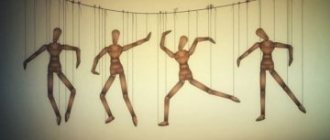Distorted perception of reality
In the process of working with clients, it is easy to notice that the way he perceives what is happening is important for a person’s state of mind.
Perception is the beginning and the end of how a person feels, what actions he performs, what character traits he acquires, how he lives, what fate he reaps.
When working with any request, I am forced and invariably come to the beginning, the source from which it all began. This is how a person perceived the situation.
When a client talks a lot and in detail about his difficulties, failures, injustice, illness, humiliation, fear, rejection, etc., then I understand that the essence of his experiences lies in the assessment of the event as negative, the consequences of which cannot be overcome. This is the first thing you can work with; the rest of what the client is worried about can fall apart during the work on its own.
We are taught to evaluate, i.e. interpret events from early childhood. The baby is already told: “This is not good. This can’t be done, it will be va-va.” The student is given grades, pointing out mistakes, without focusing on what is good. This is how we learn negative thinking.
The first thing we do when faced with life events is to instinctively evaluate what is happening: dangerous - not dangerous, right - wrong, good - bad. This is how we learn black and white thinking.
Clients, when describing their problem, talk about events in terms of assessment and interpretation. It is very difficult to obtain a statement of simple facts in order to form an independent view. The client immediately offers his own interpretation of events from the point of view of his experience and upbringing. There is no impartial presentation of facts and analysis as such. And there is immediately an assessment, an interpretation, which is accepted as the truth. Of course, this is true for this person. But if we take into account that each person has his own unique experience and upbringing, then we have to admit that everyone has their own view, everyone looks at the same event through their own filter, which takes into account some facts, discards others as unimportant or does not notice them as if they did not exist.
Consciousness works selectively and associatively. This is a feature of the psyche. This protects the psyche from overload. Consciousness, as it were, scans events and highlights what is consistent with existing beliefs. This perception is unconscious and typical for any person.
Thus, all distortions begin with perception, and this subsequently leads to destruction.
Is it right to say that if you change your perception style, you can avoid undesirable consequences in the form of illnesses, failures, and nervous disorders?
Is realistic perception possible in principle?
In any case, you can set the task: to bring the existing perception closer to reality, and then the client himself will witness how his life difficulties crumble one after another.
The difficulty lies in the fact that the client lives in captivity of his images and ideals and does not connect his problems with errors of perception. He clings tenaciously to his beliefs, which were created under certain circumstances and are not valid in other contexts. These beliefs are the support in life, the guidelines that guide the path of life.
It is difficult for a person to tolerate uncertainty. The unknown scares him. He is afraid to trust not in ideas, but in life itself, which is unfolding right now in its incomprehensible reality right in front of him. And he directs his attention to his head, to reasoning, to comparisons with ideals, to assessments and criticism. Fear of the unknowable forces one to define, explain, give interpretations to everything that happens: this is why, he thinks this, they want this,... - explanations, justifications, thinking for others.
It's scary to throw away ideas, and face the truth, and accept life as it is, without explanations or excuses.
It’s scary to give up black and white thinking, to say to yourself: it happens like this, but it happens differently, it’s different for everyone, a lot depends on the context.
A pattern of perception has been created, and it takes courage to overcome it.
When a person gets stuck in the emotional assessment of what is happening, he does not act. Again and again he experiences the event as not fair, not right.
We need to wake up from the hypnosis of created ideal images and ask ourselves: if this is so, how can I act for the benefit of myself and others? Is it possible to improve anything? How can we make something good out of this?
There are no distortions of perception when a person perceives only what is, without adding or subtracting anything. We often do not realize how much we are in isolation from reality, we endow objects with non-existent qualities, we assume and guess without having real facts for this. The more thoughts are divorced from reality, the more incomprehensible and destructive the individual’s behavior seems to others.
It seems that it’s easier to see only what is, without allowing the mind to play out in its fantasies? In reality this turns out to be difficult. A restless mind reproduces new thoughts without stopping, regardless of the person’s will. Sometimes the mind completely drags a person into its sweet fantasies of happiness or suffering. It is surprising that experiences from fantasies are just as real as those from real events. That is, in fantasies, events are not real, but experiences are real. This trap is addictive with its simplicity and accessibility. You can simply, effortlessly, have a wide variety of experiences without, as it seems, putting yourself at risk. It is difficult to escape from such an infantile emotional experience. The side effect is that real life is bursting at the seams. A person becomes non-adaptive and becomes more and more inappropriate in behavior, breaking away from reality.
Mental activity is natural and necessary for humans. It is useful for scientific and creative activities that have specific goals and achievements. Creative mental energy can be directed to analyzing facts, planning events in your life, and finding ways to achieve your goals. But a person with a distorted perception gets stuck in assessments and emotions and is inactive. He conducts endless monologues, reasoning and proving, resisting what is.
It seems to me that one of the most important tasks of any person is to develop the ability to perceive reality realistically. This kind of work can be done independently with the help of concentration training. Methods available to everyone: prayers, meditation, concentration exercises.
The ability to see clearly and clearly, without clouding, brings a calm attitude to current events into life and allows you to more effectively solve life’s problems. Accepting everything that is allows you to agree with life as a whole, with the fact that life is larger than an individual person, and it is naive for a small part to fight against the whole. Reverence for the fact that more of us gives us the opportunity to measure our strength and not waste it on something that is impossible not to fight at windmills.
An impartial perception of what exists expands the horizons of vision, allowing you to step out of the framework of narrow thinking, encounter something new and gain new experience. Broad vision allows you to see options for solving problems that were previously hidden from view.
The human brain tends to trust spoken rather than written language.
One day scientists conducted an experiment. They divided people into two groups, one of which was given texts to listen to on a variety of topics. And the second is to read the same thing in writing. And it turned out that those who received the information by ear treated it with more confidence than people who received it in writing. The latter were critical, disputed, ridiculed or simply denied many things. What is the reason for this effect? In a dialogue with a person, a significant role is played by voice, intonation, facial expressions, and authority, to which we subconsciously add advantages. Whereas in written speech this is not the case, the brain can misinterpret the text, highlight the wrong ideas, making the author stupider than he really is.
Causes
Causes:
- Taking medications, alcohol, or drugs that distort the perception of reality.
- Natural physical processes in nature - mirages, rainbows, refraction of light through drops of water.
- A distortion imposed by the opinions of other people.
- Mental disorders, diseases.
- Physical pathologies. For example, in extreme heat, an individual may become delirious and see imaginary objects.
- Strong experiences, stress, nervous breakdowns, depression.
An interesting cause of illusions is synesthesia. This is a process of mixing feelings. Synesthesia is very common among creative people:
- Many musicians report that they can see special colors when playing melodies.
- Poets say that when looking at different images they hear sounds that are not really there.
As long as we feel, we live
If perception is a holistic picture-representation of the surrounding world, then sensation is the process of displaying individual qualities and properties of objects as a result of their impact on the human senses.
Only those living beings that have a nervous system have the ability to gain such experience. Awareness of sensations comes with the presence of a brain.
Sensation is the initial link in a person’s knowledge of both the external and internal world.
The stimuli that provoke this phenomenon are different, hence the existence of different types of sensation:
- visual;
- cutaneous;
- auditory;
- associated with the muscle system and internal organs.
We overestimate our influence on events
In 1975, Ellen Langer conducted a “lottery experiment”, during which she discovered people’s unfounded belief in the ability to control the course of events. So, one half of the participants were given lottery tickets, while the others were allowed to choose them themselves. Then both groups were offered to exchange their tickets for the opportunity to participate in a lottery with much greater chances of success and better prizes. But people from the second group refused the exchange, fearing to frighten away their luck. Their action was illogical. But they really believed that they could influence the probability of winning, since they themselves chose the number.
Block 1. Cognitive distortion of reality. DIVISION FROM THE TOPIC.
Reason for going off topic.
Some comments to the previous two published parts on the topic of the article once again made me realize the depth of the illness called LACK OF SYSTEMIC THINKING . And so now I’ll digress a little from the topic outlined above, to which I’ll return in a couple of minutes.
The article “What is the illusion of formal logic?”
1.1. What is your luck?
If you are reading this article, then you are LUCKY!
– You got a lucky ticket for the first time when you inherited genes responsible for the development of stronger cognitive abilities than the average in the population!
– You got a lucky ticket for the second time when you received or are receiving a quality education (primary, secondary, higher)!
– You got a lucky ticket for the third time. You retained your own curiosity because you chose a complex and controversial topic to read.
1.2. What were you unlucky about?
You live in a period of time when humanity still continues to be DEEPLY SICK in matters of rational thinking. We, people, are amazed by so many ILLUSIONS, DISTORTIONS in the field of thinking that we are still balancing on the “edge of a knife.”
"I do not like when someone lies to me. But I'm also tired of the truth. I tried to find shelter, They say I didn't look well. I don’t know what the percentage of Crazy people is at a given hour, But if you believe your eyes and ears, it’s several times more.”
Viktor Tsoi “Anthill”.
We are ready to start a small war (over trifles with our wife or our own child) or a big war (with another state or against the whole world) against those who are against us, because those who are against us THINK DIFFERENTLY (the bottom line).
At this moment we are sick with wrong thinking and it’s time to accept and admit it!
This worries me deeply! And that’s why I TEACH systemic negotiations.
1.3. Why do I call you negotiators?
Someone will say to themselves that I am not a negotiator at all. After all, my work, my occupation does not involve negotiations. And of course he will make a mistake with his statement.
Why is that?
1 NEGOTIATION is a way to encourage another person to take a specific action that is of value to you. Therefore, you negotiate, if not every day, then almost every day. It is the opponent's action that you need that is the goal. The action of another person is a subject of negotiation. Perhaps you will say that an ORDER also forces another to act as you need, but this is NOT NEGOTIATION . And of course you will be right! The difference between negotiation and order is significant.
2 NEGOTIATION is the launch of behavioral reactions that correspond to the values, will and desires of your opponent.
3 ORDER is a FORCE CAPTURE , when the opponent is forced to perform an action, contrary to his values, will, desires.
COOPERATION is valuable to you , then you negotiate. In this case, your opponent is a CONDUCTOR .
5 If it is important for you to achieve your goal in any way, then you use a POWER GRIP. In this case, the other person is a PUPpet .
Now you will say that I have deviated from the topic. Why am I talking about negotiations in an article devoted to criticism of formal logic? Everything is very simple! In order to QUALITATIVELY INFLUENCE the DECISION and ACTION of another person, you need to THINK CORRECTLY .
1.4. What do I mean by right thinking?
1. Systems thinking.
2. Bayesian thinking.
3. Rational thinking.
4. Mathematical thinking.
The essence is the same. This way of thinking presupposes INTERNAL ORDER in the organization of causes and effects, in the assessment of a priori and posterior probabilities, in the understanding of MATHEMATICAL LOGIC.
The goal of systems thinking is to achieve maximum correspondence between one’s own COGNITIVE MODEL OF THE WORLD (virtual model) and the CLASSICAL PHYSICAL WORLD of the OBJECTIVE QUANTUM WORLD available to you and me ).
VIDEO “Negotiations. How to establish control over the boss?!”
Responsive WordPress Gallery Plugin
Sense organs and receptors
In addition to the six senses known to everyone from school, the human body perceives many more stimuli. So, there are receptors responsible for the perception of heat - cold, pain, as well as sensations of your body. So science identifies not six, but 9 types of sensations:
- vision;
- hearing;
- sense of smell;
- touch;
- equibrioception - sense of balance;
- taste;
- nociception - perception of pain;
- thermoception - feeling of heat;
- proprioception - spatial awareness of your body.
Receiving information about the world around us with the help of various receptors, the brain processes it into perceptions of the surrounding reality.
Movie preferences affect relationship satisfaction
What films do you like to go to the cinema to see, what books do you read? It turns out that our genre preferences directly affect the success of relationships with the opposite sex. People who prefer fantasy and classics are more likely to have a happy marriage, unlike those who choose romance novels or watch one comedy after another. The first ones know how to separate their fantasies from reality. They do not set high expectations for their partner and tend to forgive other people’s imperfections. The latter are fixated on searching for the ideal. They are not ready to put up with compromises and often try to make their partner their own. Need I say that in the second case nothing good will come of it?
The taste of food shapes our mood
Taste sensations can indeed influence our behavior. Thus, a cup of coffee not only increases work productivity, but also adds positivity, reducing the number of suicidal thoughts. Eating lemon and sour foods helps overcome internal inertia and adds determination and excitement to a person. If you are very worried or regret something, a glass of ice water will relieve this condition, reducing the degree of worry. Whereas hot drinks will intensify it, leading to depression and self-criticism. This is an interesting pattern.










